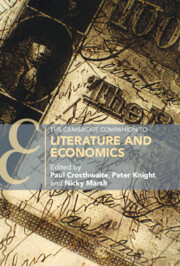Book contents
- The Cambridge Companion to Literature and Economics
- The Cambridge Companion to Literature and Economics
- Copyright page
- Contents
- Contributors
- Introduction
- Part I Histories and Critical Traditions
- Part II Contemporary Critical Perspectives
- Part III Interdisciplinary Exchanges
- Further Reading
- Index
- Cambridge Companions To …
Introduction
The Interwovenness of Literature and Economics
Published online by Cambridge University Press: 28 July 2022
- The Cambridge Companion to Literature and Economics
- The Cambridge Companion to Literature and Economics
- Copyright page
- Contents
- Contributors
- Introduction
- Part I Histories and Critical Traditions
- Part II Contemporary Critical Perspectives
- Part III Interdisciplinary Exchanges
- Further Reading
- Index
- Cambridge Companions To …
Summary
This Introduction provides an overview of the key ways in which literature and economics intersect. It firstly considers how literary texts encode economic knowledge in metaphorical – and more broadly tropic – uses of economic vocabulary, and via styles and forms that stand in a “homological” relation to monetary and financial systems. It then explains how critics have understood the ongoing overlaps between literature and economics as “genres” of writing, which have continued to borrow conventions from one another, even as the discipline of economics has become increasingly technical and mathematical. The Introduction next addresses the ways in which literary texts register the economic pressures to which they are most directly exposed: namely, the pressures of literary consumption and the literary marketplace. It closes by showing how social scientists are increasingly turning to literature and literary studies for economic insights, and by highlighting the emergence of the Economic Humanities as an interdisciplinary research field to which the approaches covered in this Cambridge Companion have made defining contributions.
- Type
- Chapter
- Information
- The Cambridge Companion to Literature and Economics , pp. 1 - 16Publisher: Cambridge University PressPrint publication year: 2022

